#disability theology
Text
Jesus needed accommodations too
Again, Jesus began to teach beside the lake. Such a massive crowd gathered that he climbed into a boat there on the lake. He sat in the boat while the whole crowd was nearby on the shore.
- Mark 4:1
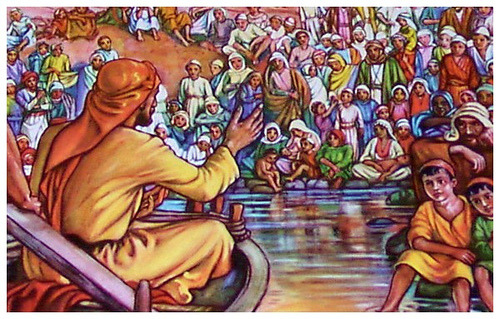
The Gospels — particularly Mark — frequently show Jesus to be sensitive to touch.
As an Autistic person for whom physical contact can be quite literally painful, I am encouraged by how, when crowds press in — teeming with reaching hands, loud with pleas for healing — Jesus doesn’t give in to the pressure to sacrifice his own needs for theirs; he finds ways to honor both.
At extreme moments, that looks like leaving the crowd behind entirely (e.g. Matthew 14:13). More often, Jesus prioritizes the people’s needs all day, then tends to himself in night’s stillness (e.g. Mark 1:35).
Other times, like here, he finds creative ways to serve the crowds and himself at the same time!
With the boat as an accommodation, the shoreline as a boundary, Jesus can teach all day without being exhausted — and even has energy left over for deeper conversation with his closest friends.
How can the knowledge that, in Jesus, God experienced the need for boundaries and accommodations empower you to honor your own unique needs? What creative solutions can you think up to balance your needs and communal ones?
- Posted on Daily Ripple for 13 Feb, 2024
280 notes
·
View notes
Text
I'd like to know if anyone has any theological/religious books relating to mental illness. I found the Cerulean Soul and its relational approach to theology and depression. I was wondering if anyone had anything that might relate to stuff like personality disorders and trauma in general.
4 notes
·
View notes
Link
8 notes
·
View notes
Text
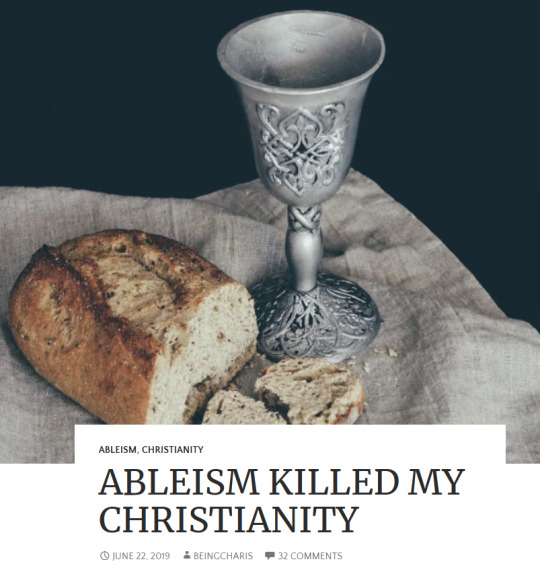
I am torn between a sense of solidarity and devastation that that feeling of existing parallel to places you either used to belong or should belong, is so relatable. People and friends who may want to help but don't know how to, instead disappear back into the familiarity and normativity that is visible to you, but also out of your reach. And you breathe through knowing that they don't know how to help, but more pointedly are too fearful of what that could entail, that might upset their own familiar and norm, to try. Intentions are good, but hope that would inspire innovative action can be all but silent unless you already *know*.
This is not only true in the Church, but in all social circles I have ever experienced, being inside, alongside, or outside.
This is why critical thinking and the kind of liberation theology I have been swallowed into is so incredibly important because when we are so enveloped by Normativity, we are blind not to those who aren't but blind to solutions that could invite them in where we are, we cannot see their obstacles that we've made or perpetuated. We MUST look to the marginalized and we must HEAR them when they spell out what is in the way of connection. They're the only ones who can notice it because of the chasm between our vantage points.
This is why Paulo Freire wrote Pedagogy of the Oppressed that demands universal participation in dialogue, but that the salvation from being or becoming oppressors can only lie in the oppressed.
#tw religion#ableism#marginalization#paulo freire#pedagogy of the oppressed#liberation theology#queer theology#kink theology#disability theology#belonging#connection
1 note
·
View note
Text
An excerpt from my dissertation I'm particularly proud of writing today:
The final glorification and redemption of humanity will not be a conveyor belt that takes in non-normative bodies and spits out normative ones, as if normative bodies and minds were a thing that God originally desired for us to have. If that were the case, human variation and diversity would not exist. Rather, God’s image is present in each of us, and the variation and diversity that we all inhabit were intended from the beginning, for the fullness of God’s image to be given form in humanity. This is not to say God causes disability, but rather through disability, God can be clearly seen, much like Eiesland saw God in a sip-puff wheelchair. We are made to embody God through our loving kindness towards each other, our mutual vulnerability, and our mutual interdependence. We reflect the community that exists in God, and in doing so, reflect the image of God in our community.
#dissertation#phd#disability#theology#disability rights#disability theology#eschatology#christianity
1 note
·
View note
Text
Romans 8 1-17 life through the spirt sermon
8 Therefore, there is now no condemnation for those who are in Christ Jesus, 2 because through Christ Jesus the law of the Spirit who gives life has …
Romans 8 1-17 life through the spirt sermon
This is fantastically written – it’s one of those passage’s where a knowledge of disability theology adds a whole new dimension.
For me I have a connective tissues disorder so my flesh has always been…
View On WordPress
#Bible#bible study#Christianity#chronic illness#disability#disability theology#ehlers danlos syndrome#reblog#theology
0 notes
Text
I don’t usually post about media stuff here but I’m so excited that Liz Carr has been cast an an angel in good omens 2.
There’s such a common Christian narrative that disability is a sign of disconnection from God. It’s a curse from god or the work of the devil or something along those lines. It’s an idea that touches so many disabled people in negative ways – it suggests disabled people are being punished for something, or that we’re not as close to God as abled people. People say that disability won’t go with someone to heaven without knowing what a person’s relationship to their disability is.
To have a visibly disabled woman cast as an angel is exciting because it shows a disabled woman being close to god, a person with a visibly disabled body has been cast as a being that traditionally is associated with embodying perfection.
I really hope this is the case anyway
#good omens#please excuse any iffy theology – I was brought up atheist in a culturally christian environment so I don’t know very much about angels#but I do know how some Christian people have talked to me about my disability
329 notes
·
View notes
Text
I’m curious if other communists have like a religious relationship to their political beliefs for lack of a better word? That’s not a good word to use but I don’t know how else to describe it. I’m solidly atheist but all of the feelings and emotions religious people talk about, revelation and spiritual connection to community and so on are all things I experience pretty regularly and I interpret those feelings as fundamentally communist. the way I take in and absorb information in particular feels revelatory in a religious sense. I’m pretty sure this is fairly common with MLs but I’m curious about it in general
#disabling rbs because I don’t want this to leave my blog#I’m using religious in a deliberately loaded way because I lack the language for alternatives#I joke frequently with my friend that communism is the religion of science but like I do unironically believe that lol#also not claiming marxism is ‘just another religion’ I do not think that’s true or useful to think of it in those terms#but if you take political theology seriously the belief in a socialist state is like the modern version of a desire for religious authority#anyway sorry extremely complicated things that I’m not remotely expanding on enough#I’ve just been thinking about it a lot recently#it’s like a totalising force in my life and shapes the way I interpret and understand the world and my relationship to it#I remember reading marx for the first time and in a very real sense I ‘converted’ to being a communist#I need to read more Benjamin because he goes into like jewish mythology and stuff in his work#but like him talking about the divine violence of the state made it click for me and is partly responsible for me making this post
53 notes
·
View notes
Text

hello all! on this Trans Day of Visibility, i'm so pleased to announce the release of the full Volume I of Siddur Davar Ḥadash, an attempt to imagine a de-gendered, de-stigmatized Jewish liturgy for Shabbat and Festivals. this full release includes the full morning and afternoon liturgies in addition to the previously available evening service, and all Hebrew prayers are fully transliterated and translated into English. the siddur is freely available as a PDF, HTML page, and plaintext file; click on over and check it out if it seems like something you'd be into!
#siddur#prayerbook#Judaism#Jumblr#Trans Day of Visibility#TDoV#trans Judaism#queer Judaism#disabled Judaism#my kind of theology#we write it like g-d so we can avoid the namesearch when we shittalk#Siddur Davar Ḥadash#my work
26 notes
·
View notes
Text
something that really gets to me in queer christianity is like...the difference between “God accepts Gays” and “God is against queerphobia”
so many places i tried that claimed to be “queer” were just focusing on debunking all the verses people use to be homophobic. it’s like, “here’s the same shit as before, but we took out the blatant homophobia.” and that’s all well and good, but Queer Theology goes so far beyond that. it’s looking at jonathan and david from a gay perspective, and naomi and ruth from a lesbian perspective, and the transfiguration from a trans perspective. its raising up queer voices and recognizing that our perspective is not just different, but necessary to create a complete picture. God doesn’t just Not Hate Us. we aren’t just Tolerated. We are valued.
#queer christianity#like the previous reblog said#if your theology drives people to hate themselves#it isnt just 'wrong' or 'incomplete'#its actively blasphemous#queer theology is a lot more than those stories too like i dont think youre Doing It Right#if you dont also consider interfaith and disabled and nonwhite and all the other voices too#but i wanted to keep this post specifically about queer stuff that was fairly obvious
846 notes
·
View notes
Note
Due to flare ups, I’ve been thinking more about my relationship with my disabilities and my relationship with God — any good resources/book you can recommend?
Hey there, sending love and solidarity as you go through flare ups and as you explore all this <3
You came to the right place — disability theology is one of my great passions! Here are my recs for you. If anyone has more resources to add on or insights for anon, please share!
For starters...
First, you might enjoy wandering through my #disability theology tag over on my other blog, which includes excerpts from various disability theologians.
Or reading through / praying with the disability text prayers I shared here last July for Disability Pride Month, which were written by a variety of disabled folks.
Since it's Lent, Unbound's Disabling Lent: An Anti-Ableist Lenten Devotional is timely!
___
Memoirs Exploring Christian Faith & Chronic Pain / Illness
My Body and Other Crumbling Empires, Lyndsey Medford (2023)
This memoir connects faith, chronic illness (especially autoimmune disorders), and the sickness at the heart of Western Empire / the Protestant work ethic.
How can we learn to work with instead of against our bodies? How can we rebuild our world to treat all bodies with the love and gentleness they deserve?
.
This Here Flesh, Cole Arthur Riley (2022)
An incredibly beautiful book, poetic and searing...explores the goodness of embodied life and intersections between disability (particularly chronic illness), Blackness, queerness, womanhood, and more.
Each chapter focuses on a different emotion (anger, joy, lament, love...) to teach us how to honor and listen to what we feel in our bodies.
CW for accounts of sexual assault and other forms of and abuse and trauma, as well as accounts of antiblack racism.
.
Everything Happens for a Reason and Other Lies I've Loved, Kate Bowler (2018)
If you've been steeped in any kind of prosperity gospel, "if you pray hard enough you'll be healed" type Christianity, I highly recommend this book.
Bowler writes with gentle honesty about how her chronic pain and then cancer compelled her to move away from that kind of harmful Christianity into a faith with room for doubt, grief, and a God that holds her in her suffering.
___
Disability Theology — Books, Podcasts, Videos
Disability: The Inclusive Church Resource edited by Bob Callighan (2014)
If you're interested in the perspectives of various disabled Christians, I love the range of voices they brought into this text! A great intro to how theology and church life impact disabled persons and how our churches must re-form themselves with disabled persons at the center.
.
My Disabled AND Blessed YouTube series
I've got multiple YouTube videos that draw from various disability theologians!
I especially recommend my introduction to reading the Bible with a disability lens — stressing how different biblical authors hold different views around disability; so what's God's overall message? — and my video on Luke 14's parable of the banquet!
If you have questions about or struggle with the Gospels' healing narratives, I also recommend my livestream on that topic.
.
My friend Laura's Autistic Liberation Theology Podcast (you can listen wherever you get podcasts)
Laura explores scripture through the lens of an autistic trans person who uses a wheelchair and has multiple chronic & mental illnesses.
I especially recommend their episode on "the Gethsemane of things," which takes an honest look at pain and where God is in our suffering. (Most of Laura's eps don't have transcripts, but I shared an abridged version of this ep on my podcast and it has a transcript)
"I am not your ornamental prophet" is also a great episode for thinking about what pressures are put on disabled persons and how to construct boundaries for yourself
.
The Mad and Crip Theology Podcast
This podcast interviews the authors who are published in the Mad and Crip Theology journal, which is really cool! You can watch episodes with captions on YouTube, or listen wherever you get podcasts.
A good starter episode: this one "on Queer and Crip Sexuality and the Disabled Christ"
.
Some eps of Blessed Are the Binary Breakers
While my own podcast largely centers trans perspectives, disability comes up frequently as well! Each ep has a transcript. These are the disability-focused ones:
"No End to Transphobia without Uprooting Ableism — exploring embedded forms of oppression"
"Our Pride Is Not a Sin — a Queer and Disabled Christian Lens"
"Goodness Embodied — an intersex, nonbinary first human and a disabled risen Christ"
"Marginalized Bodies as Spectacle and the good news in Jesus's disabling wounds"
"Eli and the prophet Elijah"
“Secular” books that helped shape my own theology
What Can a Body Do? How We Meet the Built World, Sara Hendren (2020)
Fantastic book digging into recent disability history, present, and future with focus on the “misfit” theory of disability where body and world interact with each other disharmoniously, and the creativity disabled people employ to make them more harmonious
.
Exile and Pride, Eli Clare (1999)
One of my favorite books of all time. Connects disability, queerness, rural life, trauma, and more. Clare is one of the originators of the concept of the “bodymind” (though he talks about that more in one of his later books)
___
Wanting even more resources? Here's my google doc with aaaaall the disability theology stuff — plus some helpful disability 101 stuff to share with loved ones!
Praying for comfort, wisdom, and community support for you as you journey! Please feel free to drop by again with any questions that come up or to share any insights you've gained any time <3
#disability theology#disabled AND blessed#disabled christians#faithfullydisabled#resources#recs#books#this reminds me i've been meaning to share more excerpts i've gathered from disability theology books...#anyone interested in that should go follow my other blog a-queer-seminarian and i'll start posting some in the coming days...
26 notes
·
View notes
Text
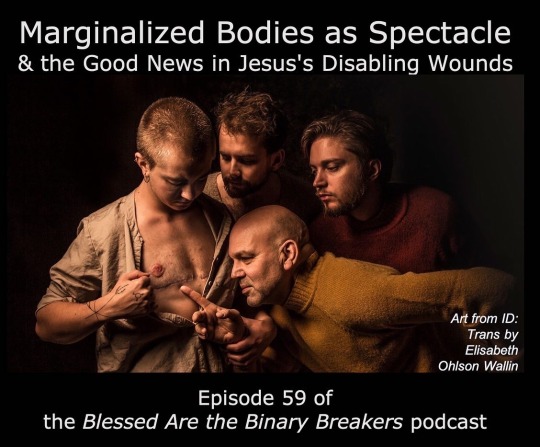
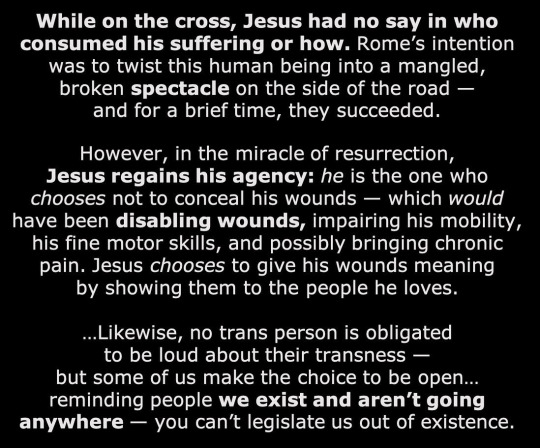
In Jesus, God rose with wounds that would have impaired his mobility and fine motor skills. In John 20, Jesus allows his disciples to gaze at his impaired body, and even lets Thomas touch his wounds. Let's explore how this story connects to the complications of marginalized bodies being put on display for public consumption — of being made into a spectacle.
Find this ep wherever you get podcasts, or visit www.blessedarethebinarybreakers.com/podcast-archive for links + and episode transcript!
Image descriptions in alt text.
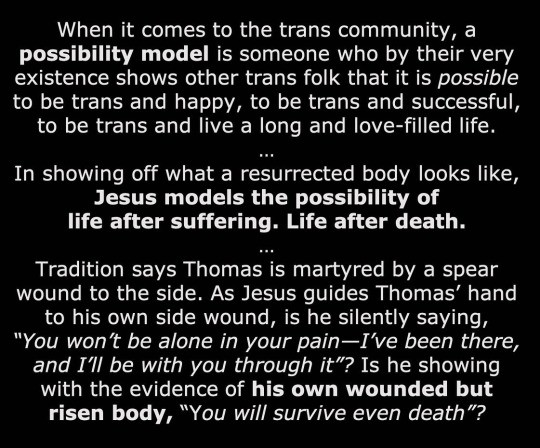
Part of this episode explores an art piece by Elisabeth Ohlson Wallin — a photograph of Jesus with top surgery scars — that you can view here.
Or view it and other images, with image descriptions, in the episode transcript.
The episode also draws from S. Bear Bergman's 2021 article "Please Come and Be Fat."
The episode ends with Rebekah Anderson's meditation "The Body of God."
A previous episode of this podcast also delves into the John 20 story of Jesus and Thomas through a trans and disabled lens — episode 40, "Goodness Embodied: An Intersex, Nonbinary First Human and a Disabled Risen Christ."
If you want to watch the sermon that this ep is based off of, visit here.
___
TALKING POINTS:
(0:00 - 3:36) - Introducing the topic: based off a sermon; Jesus's disabling wounds & marginalized bodies as spectacle
(3:37 - 6:30) - Affirmation of Faith in God the seamstress, the wounded Christ
(6:31 - 9:59) Introducing & reading John 20:19-29
(10:00 - 15:59) Identifying our experiences with Christ's — medieval labor pains; Jesus with top surgery scars
(16:00 - 21:52) - Possibility models: proving it's possible to be trans and successful & happy; Jesus proving there is life after suffering & death
(21:53 - 23:51) - Jesus on the cross was forced to be a spectacle; the resurrected Jesus has regained his agency, chooses to share his wounds
(23:52 - 26:10) - "Blessed are those who haven't seen and believe" — parallel with a friend's chronic illness & being believed
(26:11 - 29:18) - risking vulnerability — visibility politics in trans & disabled communities
(29:19 - 33:48) - The risen wounded Christ proves once and for all that what the world calls shameful & broken is not incompatible with the divine
(33:49 - end) - "Imagine the body of God...God has every ability, and every disability in the world"
#blessed are the binary breakers#faithfullylgbt#trans theology#disability theology#trans christians#disabled christians#podcast#log#spring 2022#John 20
81 notes
·
View notes
Text
The Monsters' Rhapsody
We come from regions at the edge of maps
Where details of the landscape are left out.
Those who journey there are warned of traps;
Our histories are vague, and filled with doubt.
We crouch in corners of cathedral towers,
Peering from the ledges high above
Jeering at the milky, gilded saints
With their songs of torment in the key of ‛love’.
We gather in the margins of the page,
Drawn there by those minds too quick for text
Cavorting in the space between the lines
And looking out beyond the screen of Time
At what has gone before, and what comes next
With our piercing, wide-eyed, wild, gaze.
Cartographers of power fear us most.
Perhaps by accident, or secret pledge,
They were the ones who pushed us to the edge.
To them, we are the “evil (demon) host.”
To curry favor with their patron lords,
They pondered, and they toiled, and they forged
A chain of being strung ’tween God and Earth
To justify the privilege of their birth.
With words of silk, and blood-black ink,
They braided ropes to every link
To bind each living creature into place
Then doled out dwindling portions of God’s grace.
But for themselves, they kept the greatest share –
In sight of angels in the shining air.
But we – the vast and secret multitude,
Who move through narrow spaces in between,
Traversing landscapes they have never viewed –
We slip through gaps in their great chain.
We are the neithers and the nors –
Exceptions to each rule they write:
We are the maids with fishy tails,
Who sing the doom of sailing ships,
And giants, standing miles high,
Who scrape their knees on mountain peaks,
The gryphon, werewolf, and the king
Who’s neither frog, nor yet a man.
The mother who can only crawl,
As if she were a tiny babe,
The boy who reads with fingertips,
Poets who shape words with hands,
And those who have divergent minds.
We are the neithers and the nors –
Exceptions to each rule they write.
And whether shy and shifting, or rudely bold,
We can’t be collared by their ready names –
Their inky, silky, fetters do not hold.
They say this is our crime – that we’re to blame.
That we exist at all is proof enough
The world is more complex than first it seems
They claimed a single truth. And thus, they lied –
Their mighty chain was forged from human pride,
A false conclusion, and a foolish dream.
But we are here. And we can call their bluff.
And even as we wander city streets,
Along with all the rushing, bustling crowds,
The questions rise in every gaze we meet,
And mystery surrounds us, like a cloud.
We span the borders by which this world’s defined –
Not on the globe, but rather, in the mind.
#monsters as disability metaphors#my own poetry#Medieval Christian theology#Chain of Being#disability is a social construct#authoritarian hierarchies#disablism#copyright 2016
13 notes
·
View notes
Text
Ugh sometimes I don't feel smart enough to be religious. I love the process of learning, but I know I never know as much as I want. I've met so many incredibly well spoken, intelligent people in religious circles. I don't want to add to the antitheist idea that religion is for stupid people like me. No matter how much I try to learn, I'm never going to be smart at anything.
8 notes
·
View notes
Text
The Cult of Normalcy
I'm going to talk a bit about my research and something that's really been stuck in my brain, and one of the biggest issues I've found in my work in theology and how the church in the US operates.
In the book Vulnerable Communion by Thomas Reynolds, the author talks about something he calls "the cult of normalcy."

(Thomas Reynolds, "Vulnerable Communion," pg 62.)
I've highlighted the relevant bits, but in essence, the cult of normalcy is our veneration for a baseline standard "normal" body. Any deviation from this is pathologized as not only abnormal, but deficient, and in need of correction, aka punishment through stigma. Mass media and community standards enforce normativity and conformity to extreme degrees, an impossible standard that arguably nobody can actually either attain or maintain. In the long term, nobody stays "normal" all their lives. Bodies change as the world changes them. We age. We grow. We decay. Such is the natural way of human life, but we have as a society decided that such "natural" change is in fact undesirable, and deviation from the norm will be punished.
Churches, I have found, are most susceptible to this. Whereas we ought to embrace the diversity of our communities, the variation each person can embody and celebrate, the cult of normalcy instead polices us into conformity. I have in many ways seen this done through misapplication of scripture, too, specifically Paul's letter to the Romans. Perhaps you've heard these verses tossed out by pastors seeking to tell you exactly how you ought to live your life:
"We know this because God knew them in advance, and he decided in advance that they would be conformed to the image of his Son. That way his Son would be the first of many brothers and sisters. Those who God decided in advance would be conformed to his Son, he also called. Those whom he called, he also made righteous. Those whom he made righteous, he also glorified." --Romans 8: 29-30 (CEB)
Or most ironically, this one:
"Don’t be conformed to the patterns of this world, but be transformed by the renewing of your minds so that you can figure out what God’s will is—what is good and pleasing and mature." --Romans 12:2 (CEB)
The first actively calls us to conformity, and pastors will often use this as a cudgel, completely ignoring the context of the passage. The second is the most ironic, because I've seen it paired with the message of "Don't succumb to THEIR peer pressure, succumb to OUR peer pressure, OUR definition of what being transformed looks/acts like! :) "
Christians love their conformity. They love their communities to look/exist a certain way, and when that preexisting image is countered by the real, lived experience of a community in real life, the reaction is most often to double down on rigid conformity.
I saw this a lot as I was going into ministry. I heard a lot of talk from the people in charge, excited to have such a RICHLY DIVERSE incoming class of pastors coming into ministry, and positively beaming with expectation for our ability to fill the pews with their most desired demographic: young white adults ages 18-35, ideally from middle to upper-class backgrounds! Of course, when that failed to happen, because that demographic is largely LEAVING churches, the punishment came. Out of all the people that remained in ministry in the church largely looked and lived like one specific kind of person, and wouldn't you know it, that person was a white young adult, usually male.
The cult of normalcy is insidious, and the church loves to adhere to it, especially when it doesn't know it is doing it. It makes us think "surely, this is what God wants" when that is not at all what God is doing. There is a serious disconnect between expectation and reality, and once we see that it is in place, we have to insist that no, there is no such thing as "normal."
Normal is a lie. Normal is a tidy little box that fits nothing, and God hates being in a box. We ought to resist normal with every fiber of our beings. Normalcy is a prison. Normalcy corrodes and sands down everything wild and wonderful about creation.
Reject normalcy. Embrace your weird self. It's what God made you to be. Anything less would be to deny the image of God within you.
#theology#disability#queer theology#queer#religion#christianity#bible#bible quote#scripture#i guess this turned into a sermon
25 notes
·
View notes
Text
Studyblr Intro Post
Hi fellow scholars! I’ve had this blog since 2018 but I figured it was finally time to make a studyblr introduction post. Check out below the cut to learn a bit about me.
About Me
I write under the name Esther (a name my boyfriend uses for me). I am in my mid-20s. I’m a nerd for mid-century and academic fashion. That means I try to fit most of my style into the dark and light academia aesthetics. But I also exercise a lot, so in real life, you’d tend to find me in t-shirts and jeans. I don’t subscribe to the philosophies behind personality tests, but my temperament is Melancholic-Choleric, if you’re into the four humors. 😉
I am physically and cognitively disabled from a head injury I had in high school. The injury affected just about everything in my life, but I continue to recover as the years go on. Some of my posts will focus specifically on disability and academia. Always stay open to what anger and stubbornness can accomplish!
Academics
I am currently in my first year of online studies at Franciscan University in Ohio, for a Master of Arts in Theology and Christian Ministry with a concentration in Catechetics. Biblical studies was not the field I expected to go into for most of college, but I am excited to see where it takes me. I’ll probably go into education at this point, but my dream is to go to a Ph.D. program for neuropsychology.
For undergraduate studies, I earned a Bachelor of Science in Psychology and Humanities. I wrote a book with a small colloquy for my Humanities capstone, which was published and sold by my college bookstore. We discussed Charles Dickens’s novel A Tale of Two Cities and I wrote about theological themes and conversion in the novel.
I speak English (native), Spanish (working proficiency), and modern Hebrew (beginner). Spanish and Hebrew are always in progress. Apparently my accent is perfect for both. I studied some Koine Greek in middle school and want to study that, ancient Hebrew, and Latin in graduate school. Future modern languages I am interested in learning are French, German, and maybe Chinese.
Interests
Books: classic literature, great works, theology, existentialist writing
Hobbies: sewing, playing piano (classical, jazz, and some contemporary music), exercise, writing, spending time with my dogs, language learning, studying theology
Music: classical, jazz, indie pop (specifically Belle and Sebastian), orchestral goth, Gregorian chant
I enjoy meeting new friends, so drop me a chat if you’d like to connect!
- Esther
Some frequent tags I use (links to come):
ohthehumanities: my posts
academia aesthetic
disability studyblr
theology studyblr
gradblr
langblr
#studyblr#ohthehumanities#disability studyblr#graduate studyblr#grad studyblr#langblr#spanish langblr#hebrew langblr#theology studyblr#catholic studyblr#academia aesthetic#gradblr#graduate school studyblr#gradlife#grad student#graduate school#grad school
13 notes
·
View notes